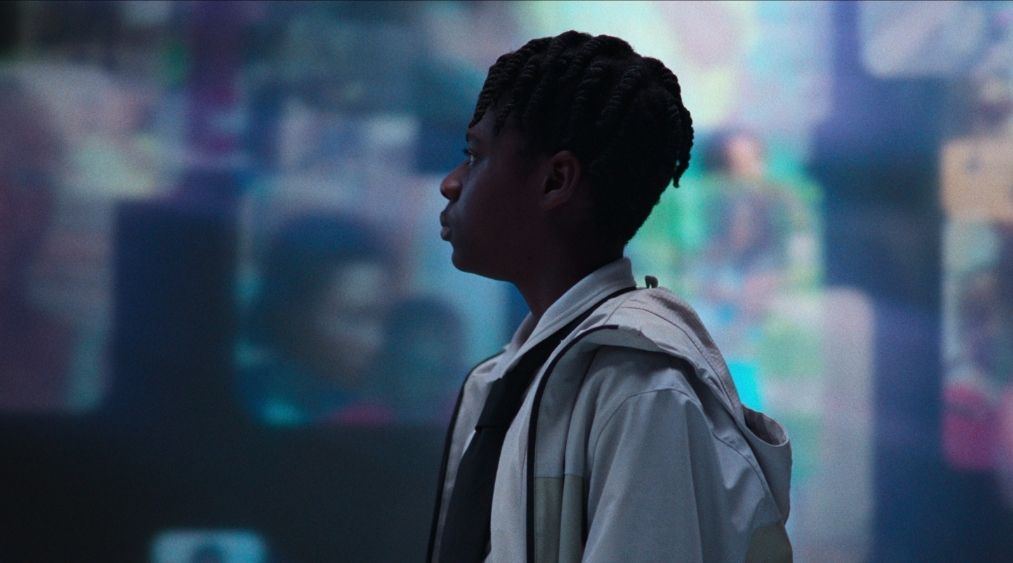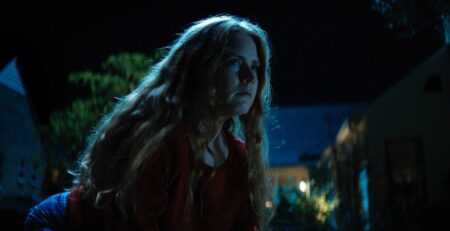The Kitchen is a sci-fi drama film directed by Kibwe Tavares and Daniel Kaluuya, in their directorial debuts. Written by Taveres and Joe Murtagh, the show stars Kane Robinson, Jedaiah Bannerman, Hope Ikpoku Jr, and Ian Wright. In a small neighbourhood called the Kitchen, regular police raids slowly empty the flats of their residents. The police enter The Kitchen each day and anyone not locked in their homes is taken away. As the violence increases, a grieving boy enters the neighbourhood, seeking comfort in a man who may be his father.
The movie may have a sci-fi tag to its genre, but that is extremely subtle. What happens within The Kitchen could easily happen now, and the community presents itself as current. The plot establishes itself quickly and the power is evident very early in the movie. The script is powered by its commentary on oppression, police brutality, and gentrification. Where some themes are understated, others are as loud as the directors can make it.
The structure of the movie is cyclical, which keeps the themes and motifs repeating. Culture and community run deep. A radio show starts each new day, narrating over the neighbourhood through speakers to provide strength to their struggles. Death is an ever-present fear, especially the concept of what comes after. The main character, Izi (Robinson) works at a funeral home where trees are planted in the caskets of the deceased. This is only for a short period of mourning however, and it is implied that once the trees reach a certain height, they and the caskets are taken away. The question of what happens to the trees becomes a haunting, burning bead within the plot. The cultural significance that comes with grieving and laying bodies to rest becomes uncomfortable when you don’t know where the bodies are.
The pace is excruciating for a huge portion of the movie. It does not need to be as long as it is, and the slow nature of the scenes can be agonising. There are periods when The Kitchen is tedious, which is a shame because the latter stages are where it shines. The movie eventually finds its heart through characters that struggle to emote. It picks up the pace and the most crucial aspect of the story reaches an ending that draws a smile. But there are huge questions that go unanswered and threads that never get their satisfying conclusion. This could be deliberate as it keeps thoughts ruminating long after. It is never really explained what happens to the victims after they are abducted by the police. It is disappointing not to get anything in the way of answers or in-depth investigation.

The casting and the characters are interesting. There appears to be an emphasis on casting non-traditional actors in many of the roles. Robinson is a pioneer of the grime music genre, going by the stage name “Kano.” He has the most acting experience however, with an important role in Top Boy. Young Bannerman has no other acting credits to his name. And Wright is a legendary footballer turned broadcaster, appearing as a pundit and personality on British television. Whilst they may not be conventional actors, their performances are sincere.
Massive credit must be given to Robinson and Bannerman, who lead the plot almost on their own. They are comfortable in silence and quieter moments. The slow pacing and long scenes actually mean that they are stuck in confined quarters together. They rarely do anything to increase the pace, but spending time with them is not uncomfortable. Absent fatherhood is one of the key themes of the movie, and so the potential rekindling of a relationship is heartwarming in a story that can feel brutal. Within this small corner of the world, a sense of hope or escape appears impossible. But for people living in low-income settings and dangerous locations, trapped by financial or other reasons, getting out is impossible.
As for Wright, his inclusion feels like a shout-out to the city where the directors are from. The man is beloved in London, a true legend and icon of the area. His voice is that sense of hope. As Lord Kitchener, Wright is the host of the radio show that plays across his domain. His monologues serve as noise within what could be considered a quiet story, and he is the perfect choice to rally a community.
The sci-fi elements of The Kitchen are extremely subtle and understated. In the extreme wide shots, the buildings may look more advanced. And there are computer screens within mirrors. But to go any further, especially with the locations, would take away the specific relevance to the modern world. The phrase “I can’t breathe” is shouted numerous times, one of the most evocative sentences in recent history. The shots of the police in their riot gear can be especially traumatic when put into the context of George Floyd and the fallout that followed.
The Kitchen has London in its veins. Every part of the film, though set in the future, is a love letter to the neighbourhoods the filmmakers grew up in. The cast is filled with icons and heroes of the community. The location, whilst filmed in Paris, has the air of the council estates that litter the UK’s capital city. The stories and themes within The Kitchen are bold for directorial debuts from Kaluuya and Tavares. Every plot line needs exploring as it gives voices to some of the most downtrodden in society. But the structure and the pacing can make the movie a tedious watch and it’s difficult to settle into.
The Kitchen is available on Netflix.
The Kitchen
-
Rating - 6.5/106.5/10
TL;DR
Every part of The Kitchen, though set in the future, is a love letter to the neighbourhoods the filmmakers grew up in.





